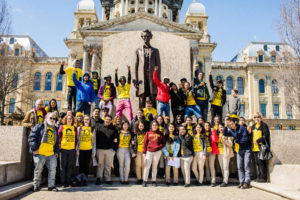By Niya Kelly, Policy Specialist
After two fiscal years without a budget, the Illinois House and Senate came together in bipartisan fashion to enact a budget and revenue package, with final veto override votes on July 6.
Two years without a budget devastated the Illinois safety net. Homeless and housing service providers laid off staff, discontinued programs, and shuttered their doors. The budget crisis not only impacted social services statewide, it jeopardized higher education’s accreditations, dropped the state’s bond rating to near-junk status, and threatened schools’ ability to reopen this fall.
Before the budget and tax measures were enacted, the state comptroller was warning that Illinois state government did not have enough cash to continue operations by August. Another hurdle was created when a federal judge ruled last week that Illinois must begin paying $586 million a month to Medicaid providers, covering a $3.1 billion backlog of unpaid bills.
More than 25% of all state-supported agencies had shuttered programming since the impasse began in 2015, according to a recent United Way survey.

In its budget advocacy, CCH staff brought more than 1,150 homeless leaders and students to Springfield for 23 lobby days over the past two years. We pushed for a responsible revenue package and to ensure homeless and housing services received adequate funding in the proposed budget.
Senate leadership began working on a “Grand Bargain” in late 2016. Then-Republican Leader Christine Radogno (Lemont) and Senate President John Cullerton (D-Chicago) worked on several compromises sought by Republican Gov. Bruce Rauner, such as pension reform and a property tax freeze, as well as school funding (Senate Bill 1), a state budget (SB6), and tax revenue (SB9).
There were times the leaders walked away from the table and called off talks. In the end, the Senate passed both SB6 and SB9. The budget bill, SB6, funds homeless and housing services for the remainder of FY17 and FY18. Based on FY15 numbers, the homeless youth line item was cut 5% for FY18, while supportive housing took a 1.8% cut, emergency and transitional housing funding remains the same, and homeless prevention grants received a 24% increase (up $975,000 from $4 million).
The SB9 revenue bill increased the personal income tax rate from 3.75% to 4.95% and the corporate tax from 5.25% to 7%. These rates will be permanent. The personal tax rate is slightly lower than a temporary 5% rate that expired in 2015, bringing in much needed revenue.
Gov. Bruce Rauner had several of his “reform” demands met in the Grand Bargain, yet he vetoed the budget and revenue bills. The Senate and the House overrode the Governor’s veto.
When the House took up the vote for SB6 and SB9, several Republicans, including floor leader Rep. Steve Andersson (R-Geneva), decided to vote yes. SB6 passed 81-34, a veto-proof margin. SB6 passed the Senate 39-6, also veto-proof. SB9 was passed 72-45 in the House and 36-18 in the Senate, again veto-proof.
CCH was an active advocate through the years of the budget crisis, partnering on the Responsible Budget Coalition.
This included CCH advocating for the release of special funds last year in budget bills HB4955/SB2603, and rallying leaders at Thompson Center protests. Homeless youth and their providers met one-on-one with Senate President Cullerton and Gov. Rauner.
CCH leaders participated in one of the largest State Capitol rallies in the state’s history, dubbed the State of Our State. CCH mobilized what’s believed to be the first sit-in at the Executive Mansion in April 2016, with youth asking the governor to release homeless funds. This May, CCH mobilized 75 leaders for an action at Gov. Rauner’s Winnetka mansion.
With budget advocacy led these past two years by Policy Specialist Niya Kelly, CCH organizers mobilized more than 1,150 leaders from all over Chicago, as well as Aurora, Bellwood, Bolingbrook, Champaign, Naperville, Niles, Palos Heights, Park Ridge, Waukegan, and Wheaton.
